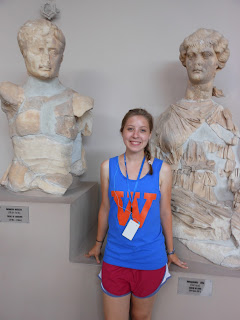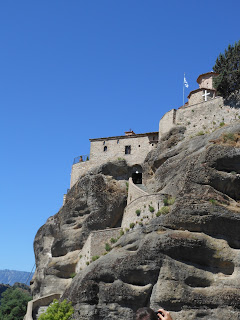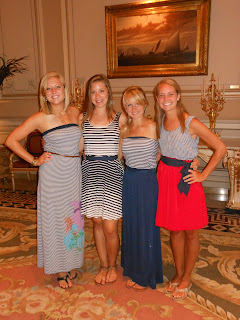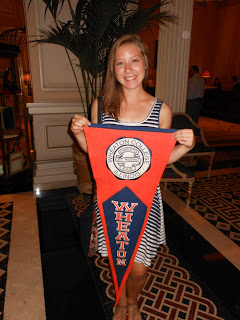It has been so long since I posted because I was gone on an
extended three day field trip for the first part of the week and then had to
prepare for an exam today. Once again
there is so much that I could write about—this is a continuing theme. Some quick highlights:
On Monday: I saw terraces in the Judean hillside and climbed
down a mountain. I visited the Sorek
Valley where Samson lived. I stood on a
hill overlooking the Elah Valley where David fought Goliath. The day ended at Ashkelon where the Wheaton
group will be doing their six week dig with Harvard. While at Ashkelon, we swam in the
Mediterranean Sea for the first time. I
loved it. The waves were large, and the
water was very blue. I collected some
shells and smooth marble rocks from the shoreline. Christabel, Elese, and I were the last ones of
the group out—all Northeast coasters who appreciate the ocean’s beaches!
On Tuesday: We spent most of the day in the wilderness in the
South. We began in the Wilderness of
Paran where the Israelites traveled through leaving Egypt. We also traveled to the Wilderness of Zin and
climbed up from the valley to the top of the mountain via steep, narrow stairs
and ladders. Then we continued northward
to the Negev visiting Beersheba (the southern boundary of the Promised Land)
and Arad (where a temple resembling the Biblical design remains in ruins).
On Wednesday: The day began at Masada (the fortress
overlooking the Dead Sea where the Jewish Zealots killed themselves to avoid
death and slavery at the hands of the Romans in AD 73). We climbed up the mountain and were impressed
by the beautiful view of the Dead Sea.
After walking around the ruins we descended via the Snake Path, which as
the name suggests wound down the mountain.
Pretty much it was forty minute walk down narrow ,winding steps. This whole field trip has had a theme of
climbing and descending! We also visited
the En Gedi spring where David hid from Saul. It was a luscious green area between the dry
Judean Wilderness and the Dead Sea. It
was here that we also “swam” in the Dead Sea.
It was so much fun! We were in it
for about an hour bobbing in the 30 percent salt water. I have never experienced anything like
it. Our final destination was Qumran. After learning so much about Qumran, I was
really excited to see the mikvahs (ritual baths) and caves where the Dead Sea
Scrolls were found.
That ended our three day field trip, and we returned to JUC.
On Thursday we drove north into the land of Ephraim and
Manasseh. This year was the first time
that JUC was able to go to the sites of Shechem and Samaria due to past
political instability. We first visited
Shiloh where the Tabernacle resided in the Promised Land. So much has happened here. Here Joshua divided up the Promised Land
among the remaining tribes. Here Eli
lived with his wicked sons. Here Hannah
prayed for a child. Here Samuel heard
God call him. It was also destroyed by
the Philistines after the Jews fell into apostasy and took the Ark of the Covenant
into battle—an illustration of God’s judgment Jeremiah used to remind Jerusalem.
In Shechem, I stood with Shelby and pondered the valley
between Mt. Ebal and Mt. Gerizim that Abraham would have seen when entering the
Promised Land. It is also right near here
that Jesus talked to the Samaritan woman at Jacob’s Well. Our last stop at Samaria (Sebaste) we saw the
ruins of Ahab’s and Jezebel’s palace as well as Herod’s theater and temple to
Augustus.
This is a quick run through of what I have seen this week,
and I could go in far more detail about what they all meant to me. However, I am afraid I do not have the time
to go into all that. I hope that in
future conversations some of that can be fleshed out in more detail. Also one last highlight from the week: last night
we got a tour of the Protestant graveyard behind JUC. It is a relatively old cemetery going back to
the 19th century. A lot of
important people are buried there including the author of “It is Well with My
Soul”, Horatio Spafford. There were some
crazy stories connected to it. The
reason I enjoyed it though, is the way that cemeteries connect history to us
today. When you stand looking at a grave,
you are looking at the place a person in history lies. It makes it real and personal.
Oh and I cannot forget to mention this! Last night just as we were beginning our tour
in the graveyard, the director of JUC giving the tour received a phone call because
there was a fire on the hill outside the school wall. We all ran to grab fire extinguishers and run
down to put it out. Some of the guys
bravely attempted to get it out, but the fire truck got there shortly after we
did and put it out. It was an exciting
night nonetheless.
Again thank you for your prayers. Our guide has been amazed that no one has
gotten lost, been separated from the group, or gotten hurt over the last two
weeks, and I know it is greatly due to the prayers of those back home. Pictures to come.







































